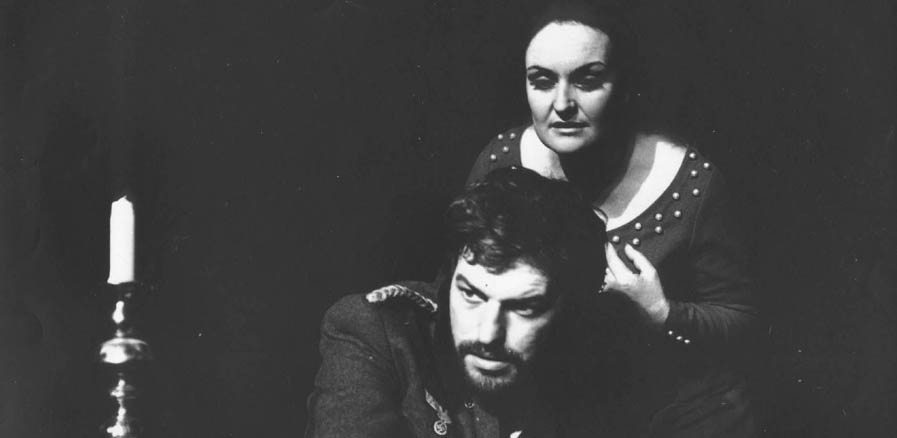Unlike Juozas Miltinis, Henrikas Vancevičius reached his peak early in his theatrical career when, as Senior Director at the Kaunas Drama Theatre, he staged Chekhov's Three Sisters in 1960, Miller's All My Sons (1962), Federico Garcia Lorca's The House of Bernarda Alba (1964) and, after assuming the leadership of the Academic Drama Theatre in Vilnius, he directed Jean-Paul Sartre's The Condemned of Altona in 1968. All of these differently themed productions were united by Vancevičius' attentive immersion into the literature and, most importantly, his capacity to recreate the piece in a theatrical language that was uniquely spiritual, subtly nuanced and sensitive to psychological reality, i.e. in a language of poetic realism.
Lithuanian theatre first encountered the aesthetic of poetic-psychological realism toward the end of the inter-war period when Juknevičius first began his directorial career, expressing a poetic, elevated and aesthetic psychology of human relations in his productions. This particular ability of Juknevičius was also displayed in one form or another in his later productions in the 1950s and 1960s: in Chekhov's Uncle Vanya in 1954, Eduardo de Filippo's Long-Legged Lies in 1958, Tennessee William's Orpheus Descending in 1962, all produced at the Academic Drama Theatre, and others. It encouraged the emergence and growth of Vancevičius' concept of poetic realism which, in truth, was given its greatest impetus by Vancevičius' own teacher, the director and scholar of the Moscow Lunacharsky State Institute for Theatre Arts (GITIS) Andrei Lobanov, a proponent of the poetic realist method.
The productions staged by Vancevičius employing this method in the 1960s were were distinguished first and foremost by a more poetic and more spiritual (more substantive than socialist realism, gentler than Miltinis' variant) understanding of dramatism. Critics employed the precise metaphor of "the most subtle vibration of human spiritual strings" Irena Aleksaitė, „Teatro šiokiadieniai ir pergalės“, Literatūra ir menas, 1963-03-02, p. 2. to describe this dramatism. Vancevičius uniquely refined a restrained imagery of the life of the human soul, founded on subdued tones and hushed and fragile references, the pursuit of which encouraged actors to develop their acting craft and to concentrate their efforts toward a deeper, more motivated and compelling interpretation of the material, and to seek a stronger ensemble and working "atmosphere." This was characteristic of the best of Vancevičius' productions: a strong tapestry of a "complex psychological narrative" was woven from actorial "material", varied by patterns made from "the complex braids of relationships". Egmontas Jansonas, „Kauno valstybinis dramos teatras“, in: Lietuvių tarybinis dramos teatras: 1957–1970, sudarė Algirdas Gaižutis, Vilnius: Vaga, 1987, p. 114, 118.
The productions also launched and showcased the individuality and talent of many actors: Gražina Balandytė (Irina in Three Sisters, Lydia Lubey in All My Sons, and Adela in The House of Bernarda Alba), Danutė Juronytė (Kate Keller in All My Sons, Magdalena in The House of Bernarda Alba), Algirdas Voščikas (All My Son's Joe), Vytautas Tomkus (Chris in All My Sons), Regimantas Adomaitis (Franz in The Condemned of Altona), among others. Vancevičius' theatre played a significant role in the increasingly creative work of Lithuanian actors in the 1960s, providing them with an opportunity to portray more complex personages on stage.
By the end of the 1960s, however, deficiencies and signs of "foundering" began to emerge in Vancevičius' poetic-psychological realism. The Condemned of Altona, for example, began to appear overly "simplified and conventionalized" despite the production's success in penetrating the depths of an injured soul and the effective portrayal of Franz's (Regimantas Adomaitis) spiritual tension, revealing "the tragic poetry of his balancing [between darkness and light, despair and hope, cynicism and love]". Antanas Vengris, „LTSR valstybinis akademinis dramos teatras“, in: Lietuvių tarybinis dramos teatras: 1957–1970, sudarė Algirdas Gaižutis, Vilnius: Vaga, 1987, p. 70-71. Vancevičius' cold literary and actorly productions smacked of oversimplification. His directing increasingly withdrew to the periphery of Lithuanian theatre and, by the 1970s, with a few exceptions, it was distant from the vitality of the main theatrical venues, contributing neither to the increasingly active and courageous pursuits of new theatrical language nor to an ever stronger civic theatre as a unique form of political resistance, failing to rise to a new level of artistic and civic maturity.
Accordingly, Lithuanian theatre from the mid-1960s increasingly lacked more visible, independent and distinctive directing. In this regard, the early works of Povilas Gaidys and Jonas Jurašas were more promising.




Comments
Write a comment